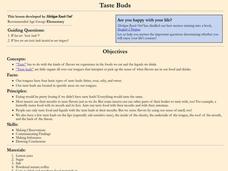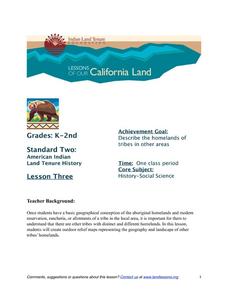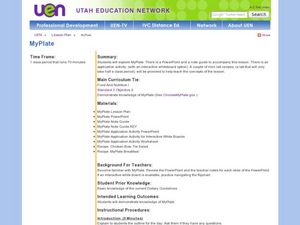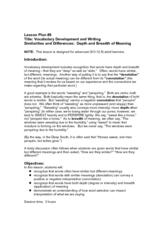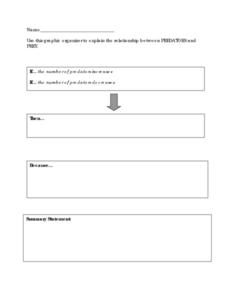Utah Education Network (UEN)
Balanced Diet
Second graders investigate the concept of a balanced diet and how the food pyramid is organized. They conduct research using the links included in the instructional activity. They differentiate the parts of the pyramid while looking at...
Curated OER
Field Trip to the Watsonville Wetlands
Students explore the differences between food webs and food chains. In this wetland lesson students play a food web game and go on a scavenger hunt.
Curated OER
Taste Buds
Students investigate taste buds. In this taste buds activity, students identify the four basic taste buds and their locations on our tongue. Students participate in an experiment to investigate how our taste buds work.
Curated OER
Principles of Ecology
In this ecology worksheet, students will review 10 vocabulary words associated with the basic principles of ecology. This worksheet has 10 fill in the blank questions.
Curated OER
Matching Meals Nutrition
Students play a matching game to practice pairing foods with their food groups. In this health and nutrition instructional activity, the class discusses food choices, then students play an on-line memory game.
Curated OER
What Food Is It?
Learners close their eyes and taste foods without using the sense of sight to identify the foods. They record what they think the food is that they tasted.
Science Matters
Oh Heron
Two teams—the environmentalists and herons—play four rounds of the game, Oh Heron. Using hand symbols to represent food, shelter, and water, players locate their match to produce more herons while those unmatched decompose.
Curated OER
The Living Environment
In this living environment worksheet, students complete a crossword puzzle given 34 clues about the various species in the environment that produce, consume and decompose. Topics also include photosynthesis, respiration, glucose, organic...
Curated OER
Basic Vitamins: Water-Soluble and Fat-Soluble
Students examine vitamins and study their functions and food sources. They research what happens to vitamins when foods are overcooked. They prepare a microwaveable vegetable quiche.
Curated OER
Science Unit Lesson Five
Sixth graders review how and which plants operate in terrariums. In groups, they follow instructions to make their own terrarium and place different types of plants in it. To end the lesson, they review the steps in the water cycle and...
California Polytechnic State University
Australian Geography Unit
At the heart of this resource is a beautifully detailed PowerPoint presentation (provided in PDF form) on the overall physical geography of Australia, basic facts about the country, Aboriginal history, and Australia culture and lifestyle.
National Wildlife Federation
What's Your Habitat?
How are third graders like rabbits? They both live in habitats and require food, water, and shelter to survive! An educational science activity encourages your learners to think about their own habitats and survival needs, before...
Curated OER
Animal Science as Agriculture
The methods by which farming and agriculture became a valid area of study and research are detailed in this PowerPoint. Also presented are the steps involved for improving productivity and efficiency. The use of scientific method...
NOAA
Through Robot Eyes
How do robots assist ocean explorers in collecting data and images? The final installment in a five-part series has science scholars examine underwater images collected by robots and identify the organisms shown. Groups then calculate...
Indian Land Tenure Foundation
More Tribal Homelands
Here is a very fun idea that introduces young learners to how geographical location affects cultural development. They are introduced to four areas where Native Americans have lived in the past by reading stories and examining images....
Houghton Mifflin Harcourt
Amazing Animals: Challenge Activities (Theme 4)
For kids who have already mastered the basic concepts in the Houghton Mifflin Harcourt thematic units on amazing animals, here's a packet of enrichment activities sure to provide food for fertile minds.
Curated OER
Primary PE Lesson
Students divide into two groups facing each other; tossing the bean bags to each other. The teacher calls out names of unhealthy food and students start to throw beanbags back and forth to their partner. When students hear a healthy...
Curated OER
MyPlate
A nice, neat PowerPoint accompanies this lesson plan, explaining each of the MyPlate dietary recommendations. Another PowerPoint gives the class the opportunity to apply the concepts of MyPlate on a worksheet. Recipes are provided for...
Curated OER
Vocabulary Development and Writing
Engage pupils in practicing denotative and connotative strategies to understand particular words. They work in pairs and write a series of sentences using each word that has a positive connotation and negative connotation. Some example...
Curated OER
Good Enough To Eat
Students are introduced to the five food groups. In groups, they place different foods into the correct section of the Food Pyramid. Using different types of technology, they create one page of a class ABC book sharing what they know...
Curated OER
America, A Home for Every Culture
Students investigate the many cultures that are represented in America. In this American culture lesson, students look at the food, languages, music, and traditions that immigrants have contributed to the face of America. They complete...
Curated OER
Dietary Guidelines/Food Pyramid Test
Young scholars list the recommended dietary guidelines and explain their function and implementation. They teat their knowledge of the Dietary Guidelines and the Food Guide Pyramid. They evaluate the servings, serving sizes, and food...
Curated OER
How do pollutants bioaccumulate and biomagnify?
Students review the basic concepts of the food chain. In small groups, they research an organism and create a food web. In addition, they study biomagnifications and write a brief essay or make a poster informing others about the...
Curated OER
Predators and Prey
Students explain how the food chain works. They contrast predators with prey and describe their function in nature. Students discuss how the food chain aids in keeping nature balanced. In small groups, they play a game that simulates the...




